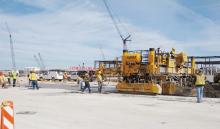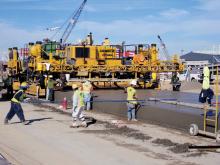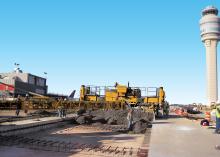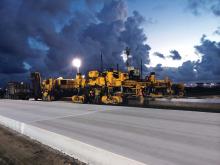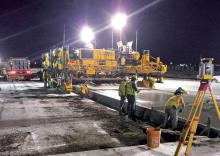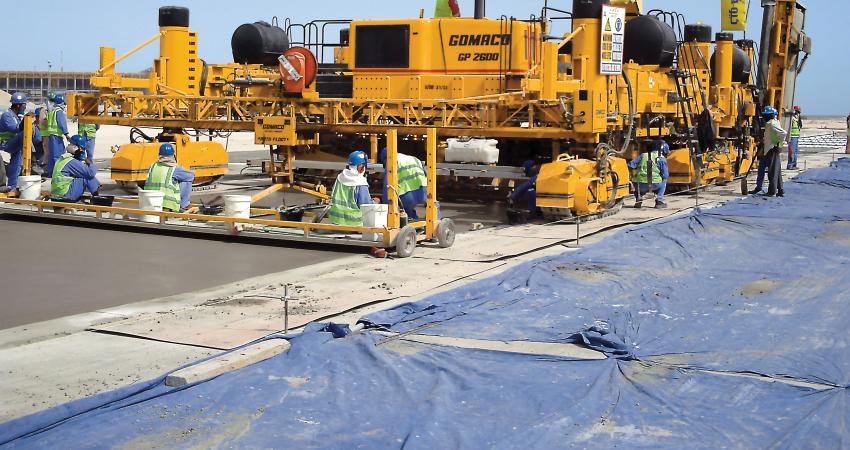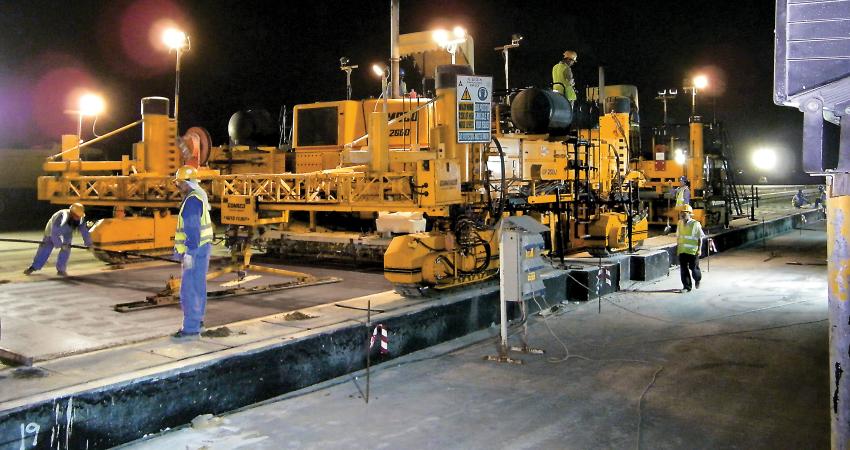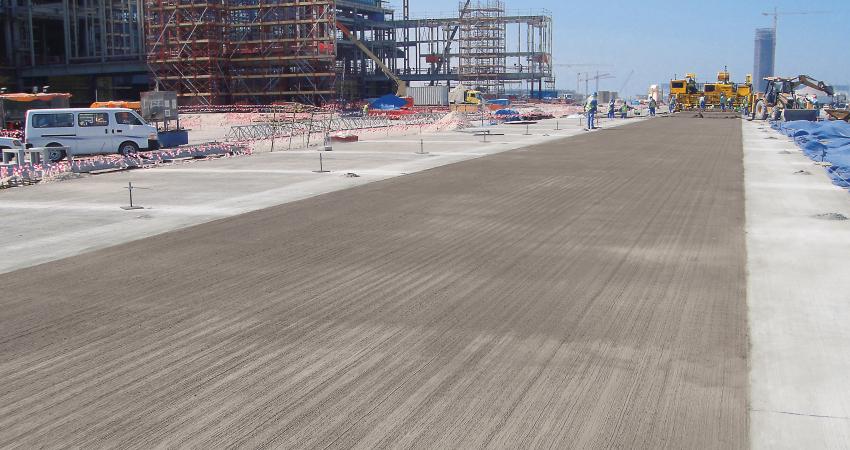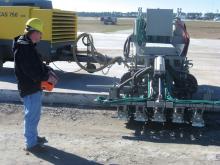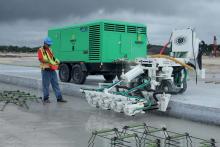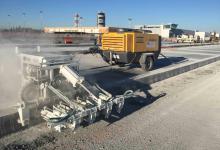High speed, high quality concrete paving can be achieved in the demanding airport environment using the latest equipment. Minnich Manufacturing has developed a novel dowel pin drilling machine and has successfully tested this equipment at Tyndall Air Force Base in Panama City, Florida. The A-5SCW is a self-propelled, cantilevered machine that features a wireless remote control and is designed to install five dowel pins simultaneously. The control system has been developed by Wisconsin Kar-Tech and uses prov
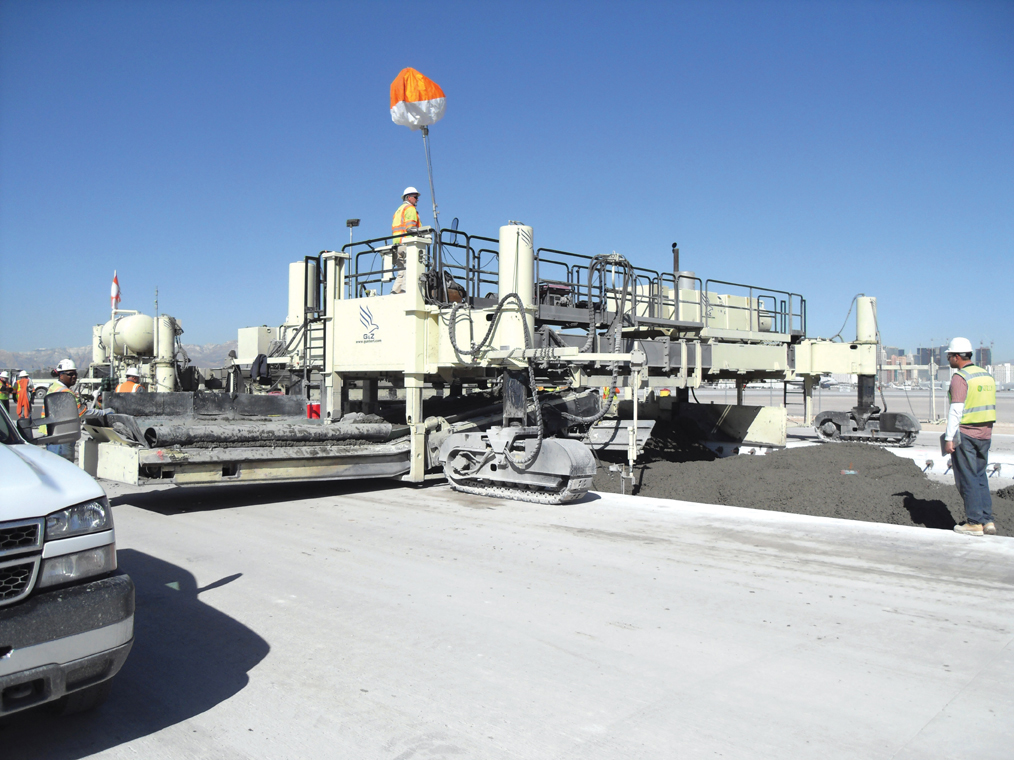
A large Guntert & Zimmerman concrete paver has been used at the busy Las Vegas international airport.
High speed, high quality concrete paving can be achieved in the demanding airport environment using the latest equipment. 286 Minnich Manufacturing has developed a novel dowel pin drilling machine and has successfully tested this equipment at Tyndall Air Force Base in Panama City, Florida. The A-5SCW is a self-propelled, cantilevered machine that features a wireless remote control and is designed to install five dowel pins simultaneously. The control system has been developed by Wisconsin Kar-Tech and uses proven technology. Along with this new control, Minnich has redesigned its entire dowel pin machine, making it lighter and shortening it, to make it more compact and manoeuvrable. Other design improvements include adding a flip-top panel, making auto controls standard, and adding a quick change depth adjustment system.
When Minnich tested the A-5SCW at Tyndall Air Force Base, the redesigned machine showed a major gain in ease of use and productivity for dowel pin drilling. The remote operation allows the operator to stand in the grade, away from jobsite traffic or commuter traffic if the drilling is along an open lane. Using a pointer the operator can align the drill unit for the next set of holes, while the crab-steer function is said to boost productivity.
Contractor Head added that the new machine can move on down the slab and continue drilling, while the operator is in a better location to position the drill more accurately and keep an eye on the hammers. The operator has a better view of the individual drills and can make quick and easy adjustments if there is any hang up. Remote operation allows the operator to step away from the dust and noise.
To prevent radio interference, each remote is programmed with its own radio ID code and each receiver is programmed only to respond to the remote with that ID code, so several remotes can work in close proximity without problems. If the contractor is using the machine in an area sensitive to signal transmissions, the remote control can be connected by a cord to the machine so that it can work without broadcasting signals.
Meanwhile US contractor Trucco Construction has slipformed a runway on the Rickenbacker Airport using its218 Gomaco Commander III machine. The firm poured some 2294m3 of concrete to a P-306 econo-base specification and this was laid to a depth of 152mm by 6m wide. On top of this, around 6881m3 of P-501 pavement was laid to a depth of 406mm by 6m wide. Some of the transverse joints had dowel baskets and the contractor also used a placer for the work.
Using the Commander III, Trucco said it averaged approximately 146m/hour and the limiting factor on production was in fact the batch plant. The slump was very critical to keep the edges up, and the head was very critical for grade. The contractor poured with dual grade on initial lanes, and then on fill-in lanes it steered off the slab and put the grade on tracks. A string was used to get off the ends of the slab by turning the grade sensors around and moving the steering sensors.
A GOMACO Commander III is also being used at the Sir Seretse Khama International Airport near Gaborone, Botswana. The four-track paver and a T/C-600 texture/cure machine are being used for a 1km extension to the existing runway at the airport. Paving passes are 4m wide and the new runway extension is 320mm thick.
All concrete is being produced by two on-site batch plants and is transported to the Commander III in dump trucks. Average slump of the concrete is 13mm. Paving starts at 6am and is finished by 2pm in the afternoon and the early start is mostly due to the hot weather of Botswana, but the area is also prone to afternoon thunderstorms. A burlap drag finish is applied to the new concrete runway and the T/C-600 follows behind applying a spray cure. Some 140m of tents cover the new concrete and are pulled along by the texture cure machine, to keep the concrete from drying too fast in the hot weather.
In addition, contractor Hi-Way Paving has been building a new runway at the Charlotte/Douglas International Airport in Charlotte, North Carolina. Two GOMACO PS-2600 placer/spreaders are working out in front of two different GOMACO pavers, a two-track and a four-track GHP-2800. All of the equipment is using the sophisticated265 Leica stringless guidance system, to ensure high accuracy can be achieved.
And a major upgrade was required at Piarco Airport, the international Airport of Trinidad and Tobago. The work was required as the country played host to the 5th Summit of the Americas, which involved the heads of government of 34 countries, including US President Obama as well as the secretary general of the UN.
The airport had insufficient facilities to park all the aircraft so the local authorities carried out extensive work to increase the number of stands available. The work involved extending the east and west aprons and laying five separate aircraft platforms, two each on the east and west aprons, and one on the south apron. The stands had to be capable of taking aircraft as large as the US Airforce One, a Boeing 747, and various Boeing 757,767,737 and Airbus Industries’ aircraft.
The work had to be carried out quickly and also with a high quality, to meet the time frame and strict airport regulations. The main contract was awarded to Jusamco, which sub-contracted the concrete production and laying requirements to specialist firm Airside Industries of Stonehaven in Aberdeenshire, Scotland. it shipped its new two-track Power Paver SF3000 models to Trinidad . They were set up to lay slabs up to 9.75m wide and 500mm deep.
The work was carried out to a conventional US specification with a 300mm layer of sub-base underneath and a foundation layer of 200mm of high quality asphalt for the concrete platforms. These platforms form islands that are then surrounded by asphalt up to finished grade.
The job was specified as having a flexural strength of 4.5MPa at 28 days, and Airside used a beam testing machine to ensure the specifications were met. In most instances the concrete achieved well above 6MPa at 14 days.
The work involved laying 15,000m² of surface area over 12 days. The Power Paver machines were set up with screed sections to lay in 6m wide stripes that were 480mm deep and achieved a placing rate of over 100m³/hour.
When Minnich tested the A-5SCW at Tyndall Air Force Base, the redesigned machine showed a major gain in ease of use and productivity for dowel pin drilling. The remote operation allows the operator to stand in the grade, away from jobsite traffic or commuter traffic if the drilling is along an open lane. Using a pointer the operator can align the drill unit for the next set of holes, while the crab-steer function is said to boost productivity.
Contractor Head added that the new machine can move on down the slab and continue drilling, while the operator is in a better location to position the drill more accurately and keep an eye on the hammers. The operator has a better view of the individual drills and can make quick and easy adjustments if there is any hang up. Remote operation allows the operator to step away from the dust and noise.
To prevent radio interference, each remote is programmed with its own radio ID code and each receiver is programmed only to respond to the remote with that ID code, so several remotes can work in close proximity without problems. If the contractor is using the machine in an area sensitive to signal transmissions, the remote control can be connected by a cord to the machine so that it can work without broadcasting signals.
Meanwhile US contractor Trucco Construction has slipformed a runway on the Rickenbacker Airport using its
Using the Commander III, Trucco said it averaged approximately 146m/hour and the limiting factor on production was in fact the batch plant. The slump was very critical to keep the edges up, and the head was very critical for grade. The contractor poured with dual grade on initial lanes, and then on fill-in lanes it steered off the slab and put the grade on tracks. A string was used to get off the ends of the slab by turning the grade sensors around and moving the steering sensors.
A GOMACO Commander III is also being used at the Sir Seretse Khama International Airport near Gaborone, Botswana. The four-track paver and a T/C-600 texture/cure machine are being used for a 1km extension to the existing runway at the airport. Paving passes are 4m wide and the new runway extension is 320mm thick.
All concrete is being produced by two on-site batch plants and is transported to the Commander III in dump trucks. Average slump of the concrete is 13mm. Paving starts at 6am and is finished by 2pm in the afternoon and the early start is mostly due to the hot weather of Botswana, but the area is also prone to afternoon thunderstorms. A burlap drag finish is applied to the new concrete runway and the T/C-600 follows behind applying a spray cure. Some 140m of tents cover the new concrete and are pulled along by the texture cure machine, to keep the concrete from drying too fast in the hot weather.
In addition, contractor Hi-Way Paving has been building a new runway at the Charlotte/Douglas International Airport in Charlotte, North Carolina. Two GOMACO PS-2600 placer/spreaders are working out in front of two different GOMACO pavers, a two-track and a four-track GHP-2800. All of the equipment is using the sophisticated
And a major upgrade was required at Piarco Airport, the international Airport of Trinidad and Tobago. The work was required as the country played host to the 5th Summit of the Americas, which involved the heads of government of 34 countries, including US President Obama as well as the secretary general of the UN.
The airport had insufficient facilities to park all the aircraft so the local authorities carried out extensive work to increase the number of stands available. The work involved extending the east and west aprons and laying five separate aircraft platforms, two each on the east and west aprons, and one on the south apron. The stands had to be capable of taking aircraft as large as the US Airforce One, a Boeing 747, and various Boeing 757,767,737 and Airbus Industries’ aircraft.
The work had to be carried out quickly and also with a high quality, to meet the time frame and strict airport regulations. The main contract was awarded to Jusamco, which sub-contracted the concrete production and laying requirements to specialist firm Airside Industries of Stonehaven in Aberdeenshire, Scotland. it shipped its new two-track Power Paver SF3000 models to Trinidad . They were set up to lay slabs up to 9.75m wide and 500mm deep.
The work was carried out to a conventional US specification with a 300mm layer of sub-base underneath and a foundation layer of 200mm of high quality asphalt for the concrete platforms. These platforms form islands that are then surrounded by asphalt up to finished grade.
The job was specified as having a flexural strength of 4.5MPa at 28 days, and Airside used a beam testing machine to ensure the specifications were met. In most instances the concrete achieved well above 6MPa at 14 days.
The work involved laying 15,000m² of surface area over 12 days. The Power Paver machines were set up with screed sections to lay in 6m wide stripes that were 480mm deep and achieved a placing rate of over 100m³/hour.

